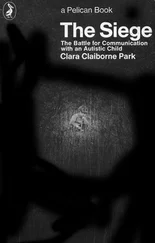Clara Park - Exiting Nirvana
Здесь есть возможность читать онлайн «Clara Park - Exiting Nirvana» весь текст электронной книги совершенно бесплатно (целиком полную версию без сокращений). В некоторых случаях можно слушать аудио, скачать через торрент в формате fb2 и присутствует краткое содержание. ISBN: , Жанр: Психология, на английском языке. Описание произведения, (предисловие) а так же отзывы посетителей доступны на портале библиотеки ЛибКат.
- Название:Exiting Nirvana
- Автор:
- Жанр:
- Год:неизвестен
- ISBN:0-316-69117-8
- Рейтинг книги:4 / 5. Голосов: 1
-
Избранное:Добавить в избранное
- Отзывы:
-
Ваша оценка:
- 80
- 1
- 2
- 3
- 4
- 5
Exiting Nirvana: краткое содержание, описание и аннотация
Предлагаем к чтению аннотацию, описание, краткое содержание или предисловие (зависит от того, что написал сам автор книги «Exiting Nirvana»). Если вы не нашли необходимую информацию о книге — напишите в комментариях, мы постараемся отыскать её.
All illustrations are by Jessy Park.
Exiting Nirvana — читать онлайн бесплатно полную книгу (весь текст) целиком
Ниже представлен текст книги, разбитый по страницам. Система сохранения места последней прочитанной страницы, позволяет с удобством читать онлайн бесплатно книгу «Exiting Nirvana», без необходимости каждый раз заново искать на чём Вы остановились. Поставьте закладку, и сможете в любой момент перейти на страницу, на которой закончили чтение.
Интервал:
Закладка:
So it is that her real achievements are in the realm of the practical, the necessary, the unromanticizable — the things that make her employable in the community and useful and welcome at home. How important it was that as a baby, however indifferent she was to others, she be attractive to them: clean, nicely dressed, no runny nose, no disgusting habits. We worked hard on that. Today she is still attractive, though not as lovely as that golden baby. Not that she cares. She has her hair cut unbecomingly short as soon as summer comes; when I suggest it’s nicer long she says it s cooler. She dresses neatly, but it’s not from any interest in her appearance that she lays her clothes out so carefully the night before; it’s because if she feels hurried in the morning, if she sleeps a single minute past seven-fifteen, she will be intensely, irrationally distressed at the deviation from this one of the many routines that structure and maintain her world.
Routine, autism’s curse and gift. Jessy is at ease only when what’s to be done is done. The distresses of deviation are balanced by the reliability and exactitude that make her an efficient mail clerk, and the daughter I couldn’t do without. Once there was no motivation, then there were points, now there is routine. Does she enjoy these tasks? The question is meaningless. She does them because she does them, because she is radically uncomfortable if they are left undone. However trying her compulsiveness may be for those around her, routine gets the work done, makes life livable.
Nor is routine incompatible with creativity; routine maintains the growing beauty of her paintings. Once a commission is received and a painting begun, it must be completed, perfectly, to the last barely visible detail. Is that all there is to it? Here too the years have been about growth, not just growth in technique, but growth in what for want of a better word I must call sociality. When her work was first exhibited, years ago in a little local gallery, she was interested only in the refreshments. She is still interested in the refreshments, but now she also enjoys the praise. When people come to the house, she says, „Do you want to see my paintings?“ and makes sure they look at every one. In 1993 a tiny reproduction of one of them was chosen to represent Massachusetts on the White House Christmas tree. When we showed her the story in the paper, she exclaimed, „So it’s the first time the president to hear from me!“ Let this be the measure of her entry into the world we share.
The point, of course, is not to make her a willing drudge, at home, at work, or at her painting table. The point, now as always, is to maintain and expand the range of activity that makes her what we never thought she could be, a busy, useful member of the household and community. She’ll be late in her forties, probably, her siblings into their fifties, when her future becomes their responsibility. Whether she stays in her own home with a companion or moves to a group home or a sheltered village or lives with a brother or sister, her active usefulness will make the road smoother both for her and for those around her.
It is not only because she is useful, however, that I can write these words with a faith in a future I will not see. Usefulness is a tremendous achievement — her own, and that of all who have accompanied her on the difficult road to activity and self-control. But it is not for her usefulness that people love her, with a love that is that future’s best guarantee. They love her for her otherworldliness, her simplicity, her utter incapacity for manipulation or malice. They love her for her childlike purity.
Childlike. I have held off from using that word, although it must have occurred more than once to anyone reading my careful transcriptions of things that Jessy has said. For all the talk of „discovering the child within us“, it is thought condescending, lacking in respect, to compare a mentally handicapped adult to a child. But those who have lived with Jessy know that the truest respect lies not in the wishful insistence that she is really just like other people, but in the recognition, and the valuing, of what she is.
Arbeiten und lieben — to work and to love; were these not Freud’s measures of success? Jessy has learned to work, even to prefer activity to idleness. A golf counter made this possible, and it seemed a miracle. But no clicking mechanism can teach love.
When I first wrote the Jessy story, thirty-four years ago, I made „love“ the final word. Love, ours and other people’s, is the condition of Jessy’s life, little as she would be able to understand that. What, then, does love mean to her, and what does it mean if I write that she has learned to love? Twenty years ago, when her sister was long away and Jessy had shown no sign of noticing, she said out of nowhere, „I am missing her“. She didn’t say the word „love“ then; like other emotion-words, it’s not part of her effective vocabulary. But I can guess how she loves, or rather, I don’t have to guess. She made it plain ten years later, in one of her „I hope you will feel better“ responses to the unwelcome fact of illness. She said it, for some reason, not with annoyance but unusual sweetness. She even elaborated: „I can’t give you a hug, because you have a cold“. I told her that what she said was a verbal hug, that it made me happy because I love her and she loves me. She picked it right up, generalizing, exploring: „And my brother loves me, because he got up from my favorite seat“. That was all, and I haven’t heard her say the word again. But it was enough; love for her is its concrete manifestations. And she’s not wrong. „He that would do good to another must do it in Minute Particulars“, wrote William Blake.
The anecdote that must end this account is about love, and an event that told me more than I knew about where Jessy is today. Though Jessy is a happy person, it is not a happy story, but it is a good one. It comes in two parts.
Of all the young people who have loved Jessy and helped her grow, there is no one who helped her more, and loved her better, than Marilyn. Marilyn lives in Oakland now, working with the deaf; we like to think Jessy contributed to that. In 1991 there was a fire in Oakland. We pointed out the picture to Jessy when the TV news came on, making sure she knew Mai was safe. The next day, when she asked, „Should I cry if I found out Mai is dead?“ we were startled but not surprised. Jessy, who must try so hard to control her crying, often asks, „Is it a good reason to cry?“
A few seasons later, she was enjoying a new acronym — one of the repeatable, manageable formalisms that help her gain a hold on the uncertainties of the world. TBA: she knows that from the college calendar — To Be Arranged, so helpful when things may not occur as scheduled. She had been planning to go visit her friend Scooch, one of the dearest of the long succession of those who’ve lived with Jessy. Scooch didn’t forget her when he graduated from Williams. As his own career carried him into the art world, he made her career his project. He commissioned a painting of his grandfather’s house. He took her to sketch it, but it was raining and she couldn’t. He was going to take her again. But he was busy and troubled, more troubled than we knew. The weeks wore on. Jessy doesn’t like to wait, but she can handle it with TBA; TBA makes her smile.
Then comes the telephone call I can still hardly believe. Scooch is dead.
Shall we tell Jessy? We decide we must; she’ll have to know sometime. She doesn’t say anything, but goes to her room. I don’t know why I don’t follow her. I guess my own emotions are too raw. I can’t bear to hear what she might say. The next day she tells me she „cried silently“; that’s how she’s supposed to cry at work, if she must cry, and certainly I didn’t hear her. She asks some questions about what she’s calling „the death“. They are factual, neutral; they are at least endurable. She doesn’t want to go with us to the funeral, and we don’t press her.
Читать дальшеИнтервал:
Закладка:
Похожие книги на «Exiting Nirvana»
Представляем Вашему вниманию похожие книги на «Exiting Nirvana» списком для выбора. Мы отобрали схожую по названию и смыслу литературу в надежде предоставить читателям больше вариантов отыскать новые, интересные, ещё непрочитанные произведения.
Обсуждение, отзывы о книге «Exiting Nirvana» и просто собственные мнения читателей. Оставьте ваши комментарии, напишите, что Вы думаете о произведении, его смысле или главных героях. Укажите что конкретно понравилось, а что нет, и почему Вы так считаете.



![Майкл Азеррад - Come as you are - история Nirvana, рассказанная Куртом Кобейном и записанная Майклом Азеррадом [litres]](/books/392533/majkl-azerrad-come-as-you-are-istoriya-nirvana-ra-thumb.webp)



![Эверетт Тру - Nirvana - Правдивая история [litres]](/books/399241/everett-tru-nirvana-pravdivaya-istoriya-litres-thumb.webp)




